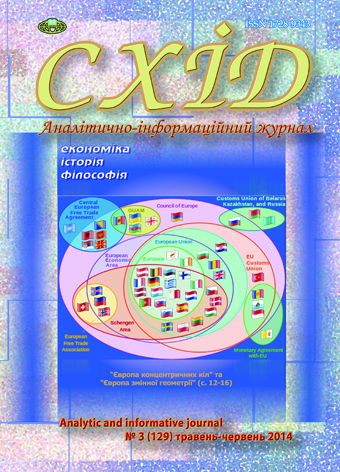Socio-philosophical views of Jonathan Swift (for example, "A Tale of a Tub")
DOI:
https://doi.org/10.21847/1728-9343.2014.3(129).25757Keywords:
Jonathan Swift, socio-philosophical and protosociological abstracts of thinkerAbstract
In this article the author analyzes the work of "A Tale of a Tub" by Jonathan Swift, emphasizing the socio-philosophical and protosociological abstracts of thinker. But it concludes that Jonathan Swift is not only a famous writer, but also an original philosopher of the Enlightenment ironic, which satirical works include items of interest to modern researchers and in many ways similar to modern realities.
The special interest, as for the author, represent Swift's views about how distracting people's attention from internal problems of the state; political agitation and its artificial amplification using the arts; causes of military conquest territory of other countries; depersonalized of social relations and the essence of social status of individuals.
The author concludes that the inclusion of Jonathan Swift's person in the course of teaching "Philosophy" and "History of Philosophy" in Ukrainian universities is necessary.
Downloads
References
Свифт Дж. Сказка бочки [Електронний ресурс] / Дж. Свифт. - Режим доступу : http://royallib.ru/read/svift_ dgonatan/skazka_bochki.html#143360.
Свифт Дж. Путешествия Гулливера. Сказка бочки / Дж. Свифт. - М. : Эксмо, 2007. - 592 с.
Зимбардо Ф. Социальное влияние / Ф. Зимбардо, М. Ляйппе. - СПб. : Питер, 2001. - 448 с.
REFERENCES
Jonathan Swift. «A Tale of a Tub», available at: http://royallib.ru/read/svift_dgonatan/skazka_bochki.html#143360 (rus).
Swift Jonathan (2007), Gulliver’s Travels. A Tale of a Tub, Moscow, 592 p. (rus).
Zimbardo F., Lyayppe M. (2001), Social influence, St. Petersburg, 448 p. (rus).
Downloads
Published
How to Cite
Issue
Section
License
Copyright (c) 2014 Vitaliy Biletskyy

This work is licensed under a Creative Commons Attribution-NonCommercial-NoDerivatives 4.0 International License.
1. Authors bear responsibility for the accuracy of facts, quotations, numbers and names used.
2. Manuscripts are not sent back.
3. The publisher does not always agree with the authors' opinion.
4. The authors reserve the right to authorship of the work and pass the first publication right of this work to the journal under the terms of a Creative Commons Attribution-NonCommercial-NoDerivatives 4.0 International License. This license allows others to distribute (copy) the published work for non-commercial purposes, provided there is mandatory attribution to its authors and a link to the first publication in our journal.
5. The authors have the right to conclude separate supplement agreements that relate to non-exclusive work distribution in the form in which it has been published by the journal (for example, to upload the work to the online storage of the journal or publish it as part of a monograph), provided that the reference to the first publication of the work in this journal is included.

